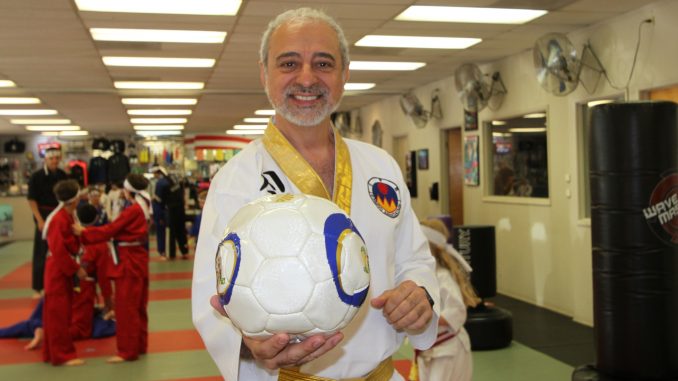
On the top shelf of the bookcase above his office desk, Farshad Azad displays a soccer ball. It’s from the 2014 World Cup, now slightly deflated—seemingly out of place among mementos more apropos of the setting, Azad’s Martial Arts Center. Yet this ball, sent from Brazil by a former student, symbolizes the journey of the man known throughout Chico as Grandmaster Azad.
His accomplishments are numerous. Azad is a 10th degree black belt in both Hapkido and Tai Chi; he holds master rank in two other forms, Jung SuWon and Kali. He’s trained professionals—special forces, law enforcement, air marshals, flight crews, bodyguards—and created his own systems of martial arts and self-defense.
At the same time, he’s made an impact with philanthropy: notably, 30 years of distributing Thanksgiving meals, plus drives for shoes and school supplies, at Azad’s. Myriad accolades for his service include recognition as a Local Hero in the CN&R.
“A lot of how he moves through life is trying to aid and support and bring different communities together,” said Sierra Grossman, vice president of Sierra Nevada Brewing Co., who’s worked with Azad on projects including the Butte Strong Fund supporting North State wildfire recovery.
All this because of a soccer ball.
The story traces to Tehran in the 1970s, the final years of the Shah’s reign in Iran. Azad, then 11, son of a judge and a principal, was playing soccer with friends when the ball went over the fence into a neighbor’s yard. “Somebody had to be a knucklehead to go [over] and get the ball,” he recalled, and that day, it was his turn.
“As soon as I found it in the bushes, some dude came out of the house: ‘Hey, what are you doing in my yard?’” Azad took off running. “The next day,” he continued, “being the intelligent kid that I was, the house of wisdom that I was, I was wearing the same thing, doing the exact same thing [playing soccer] in the same exact spot.”
The man approached, lifted Azad by the shoulders and confronted him: “‘You are the one who broke into my house.’ He was telling me, ‘You’re a thief.’ I was turning around to my buddies to help me out; nobody’s around. The loyal friends I had, they ran away.”
Faced with the prospect of going to the police or his parents, Azad negotiated to spend a month of summer break working at the man’s home. “Over there, going into someone’s yard is like going into someone’s bedroom over here,” he explained of Asian culture. “It’s that serious.”
Azad anticipated days of chores. Turned out, the neighbor had a different intention. Unbeknownst to Azad, the man—who came from Korea—was a martial artist. The tasks actually were training.
For instance, he told Azad to clear 10 feet by 10 feet of dirt, 1 foot deep, and jump out 100 times. Then dig another foot deep, jump another 100 times. Repeat.
He gained much from this teacher, whom he knew only as Master Son. Azad continued coming back after his “punishment month” and picked up skills from what he later realized were Hapkido and Tai Chi. Friends noticed new moves on the soccer field, but he kept the source a secret for fear his parents would disapprove.
By the end of the summer, Azad became physically stronger, mentally tougher and rededicated to school, where he had become disengaged. He studied with Master Son the next two years.
“So a soccer ball changed the course of my life,” he said. “I wasn’t interested in martial arts, and my parents for sure were against it, because a lot of rough kids would go to practice martial arts. It wasn’t just a sport—it was an identity that would go with the culture of being a street fighter.
“Two months of torture, which was the best two months of my life, changed my perspective about what martial arts is in true form and who a martial artist can be.”
Lessons take root
Azad’s passion for learning brought him to the U.S. as a 15-year-old. He lived with an uncle who was finishing graduate studies at Kansas University—then on his own, attending a residential Catholic prep school, once his uncle earned his PhD. Azad spoke little English when he arrived yet excelled academically, going on to earn admission to KU, where he received bachelor’s degrees in economics, political science and international relations.
“I came here because of higher education,” he said. “I wanted to study; I wanted to learn to become a better human being…. I had heard about democracy and what democracy is.”
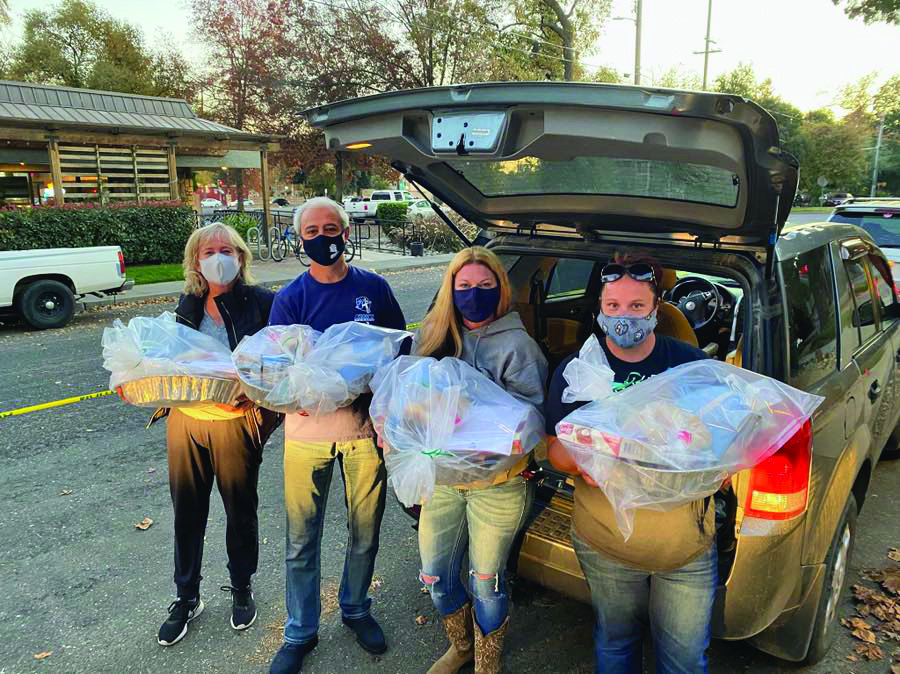
Two years after Azad emigrated, the Shah fell in the 1979 revolution that precipitated the Iran hostage crisis, in which militarized students held 52 Americans for 444 days. By then, his parents had moved his sister to England, maintaining residences in both the U.K. and Iran, and Master Son had returned to Korea.
As part of the Iranian-American community, Azad experienced challenges—“people didn’t like us very much, and we had nothing to do with the stuff going on over there,” he reflected. “It was not a very happy time in terms of social aspects.
“But it’s about the soccer ball: What you do with it, how you learn from life,” Azad added. “I was a martial artist; I’d go compete, [and] people didn’t particularly like me because of how I’d look at the time, but I didn’t care. I didn’t let anything stick. I understood where people were coming from. I felt their pain. I felt their fears. So I didn’t take it personally and I moved on.”
He came to Chico for the university’s graduate program in public administration. Working on campus while completing his master’s, Azad honored the request of his boss to teach her daughter martial arts. He insisted on doing so for free.
From the one, he gained other students. Soon, he forged a partnership with a dojo, Chico Kodenkan, and eventually spun off into Azad’s. He opened his standalone studio in 1985.
“I didn’t know business; that wasn’t my thing at all,” Azad said. Studying in college, “I was interested in worldwide economics. I wanted to improve people’s lives at a far bigger level. I didn’t go get an MBA, it was an MPA—I wanted to help elevate everyone, not just the profit side of the game.
“As a matter of fact, in martial arts, because of the way it came to me, I wasn’t interested in charging people at all. I made every single mistake you could possibly make in business to where my school is one of the most successful schools in the country right now.”
Azad’s occupies a wide storefront on Walnut Street and employs nine instructors. As the grandmaster, he holds the highest rank achievable in martial arts. Together, they teach children, teens and adults Monday through Saturday. Azad estimates 15,000 students have come through his school.
The curriculum involves more than developing skills and instilling discipline: Each youth must complete a service project that benefits the community. Many work the Basket Brigade holiday food drive and the Gimme-Some-Sole shoe drive; some create individual projects, such as yard sales and car washes for a sister dojo in the Ukraine.
Azad does so because giving back drives him.
“In the ’70s and ’80s, it wasn’t cool for businesses to be philanthropic—that was for nonprofits, that was for charities,” Azad recalled. “Businesses had nothing to do with just giving. That was not in the game at all.
“But that was part of me; that was something I was just going to do. [I decided] I’m going to bring that to my martial arts school and I’m going to teach kids to be that way, I’m going to teach adults to be that way, I’m going to guide my community or whoever wants to listen to go that way and to be that way.”
Gift of giving
Azad started Basket Brigade in 1991. He and his students raise money to deliver full Thanksgiving dinners, enough to feed 15, to families in need across the North State. The program has fed over 60,000 people.
Grossman participated last year. Inspired after working with Azad on the Butte Strong Fund at the North Valley Community Foundation, she came with her family to assemble baskets.
“What a fun event,” Grossman said. “Well-organized, positive high energy; it’s people coming together for a common cause and contributing how they can.”
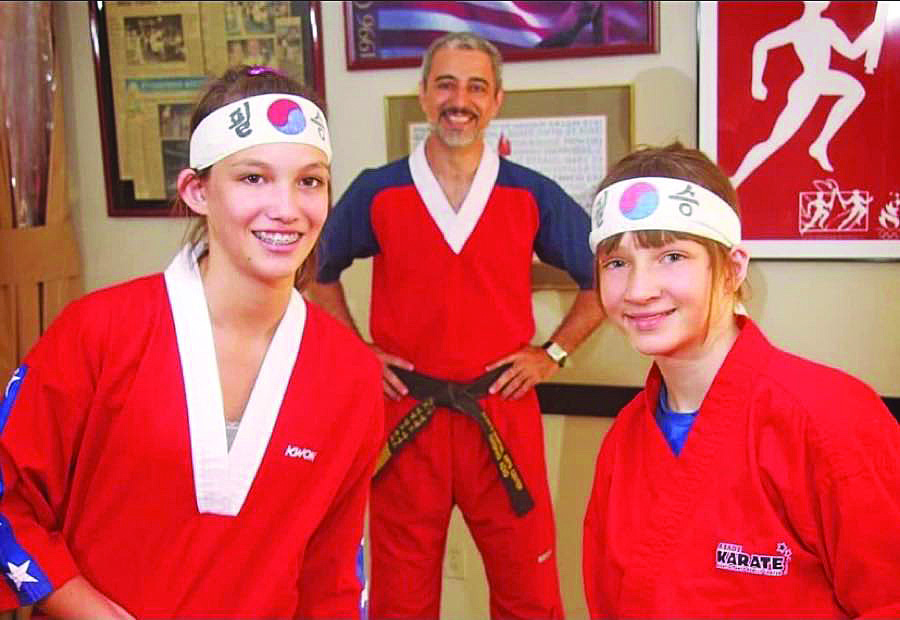
Teenage students managed the operation, directing volunteers through the various lines and ensuring completion of tasks, with adult supervision.
“It was a really neat experience,” she added, “welcoming.”
Last year’s Basket Brigade represented a milestone apart from the 30th anniversary. Azad opted to move beyond the Chico area to other cities in Butte County, with an eye toward neighboring counties.
He called Mary Sakuma, superintendent of the Butte County Office of Education and a Basket Brigade participant, to find partners—school district officials in communities without such a program.
“I remember thinking this was a huge undertaking to go from supporting one community to try to provide baskets and children to families throughout our whole county,” Sakuma said. “But I also know he’s not a philosopher who stands on the sidelines and says, ‘Somebody should do this.’ He gets in and makes it happen—and that’s exactly what he did.”
Typically serving 200 families, the effort last year brought meals to 1,000.
“That outreach from Grandmaster Azad is very illustrative of who he is as a person and who he is as a community supporter,” Sakuma added, “and really, in his own way, a community activist.”
Gimme-Some-Sole stemmed from a 2016 meeting Azad had with local principals. After hearing that shoes and rain boots represented the most pressing need for low-income kids, he initiated a month-long collection that yielded 50 pairs donated on Make a Difference Day that year. The Points of Light Foundation recognized the endeavor with a $10,000 grant that he bestowed to the Torres Community Shelter.
“He has a really amazing ability to bring people together in such a beautiful way,” Sakuma said, “and knows how to connect just the right people with the right people. He’s a remarkable man—he’s definitely had an impact on me.”
On Grossman as well. She relayed a recent encounter with Azad at the Woofstock fundraiser for the Butte Humane Society, which he attended soon after shoulder surgery. Grossman, too, had a shoulder injury, not nearly as severe.
Arm in a sling, Azad showed her some Tai Chi moves to help relax her shoulder.
“His first thing is, ‘How can I help you?’” Grossman said. “Whatever it is that you’re doing, he gives of himself, just very purely.”


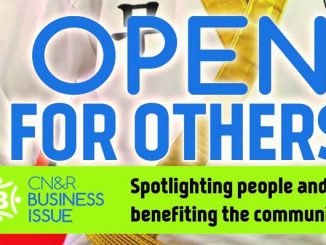
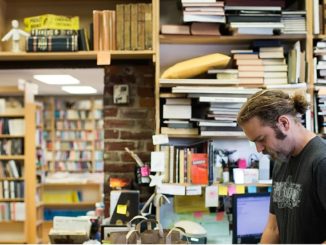
Be the first to comment